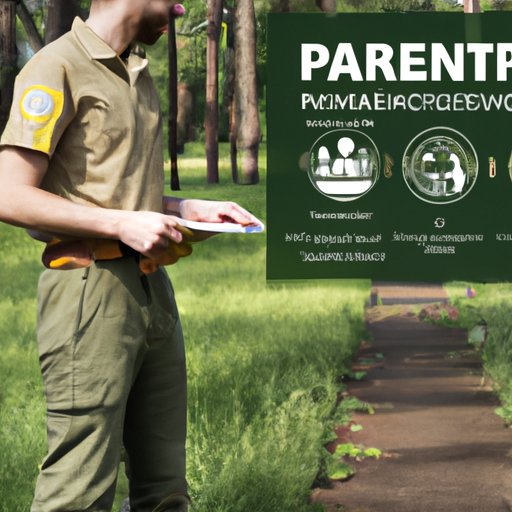Introduction
A park ranger is someone who works in a park or protected area, usually for the purpose of protecting its resources and managing recreational activities. Park rangers are responsible for maintaining public safety, providing education and interpretation to visitors, and enforcing park regulations. Becoming a park ranger involves researching educational and training requirements, exploring different types of park ranger positions, joining professional organizations, developing outdoor skills and knowledge, and networking with current park rangers.

Research the Educational and Training Requirements to Become a Park Ranger
The minimum educational requirement to become a park ranger is typically a high school diploma or equivalent. However, some employers may require postsecondary education such as an associate’s or bachelor’s degree in subjects such as park management, natural resource management, environmental science, or law enforcement. In addition, some park ranger positions may require certifications or special licenses.
Training for park rangers can include courses in emergency medical response, search and rescue techniques, law enforcement procedures, fire prevention and suppression, and hazardous materials handling. Many agencies also provide on-the-job training, which may include fieldwork, classroom instruction, and hands-on experience. Obtaining additional certifications or degrees can help you stand out from other applicants and make you more competitive for certain positions.
Learn About the Different Types of Park Ranger Positions
There are many different types of park ranger positions available, each with its own job description and qualifications. For example, some park rangers may specialize in law enforcement, while others may focus on resource management, education, or visitor services. It is important to research each type of position so that you can determine which one best fits your interests and skills.
Law enforcement park rangers are responsible for enforcing park regulations and laws, responding to emergencies, and conducting investigations. Resource management park rangers are responsible for monitoring wildlife, managing natural resources, and controlling invasive species. Education park rangers provide educational programs and interpretive tours for visitors. Visitor services park rangers assist visitors with questions and concerns, provide information about park facilities and activities, and respond to complaints.
Explore Professional Organizations for Park Rangers
Joining professional organizations for park rangers can be beneficial in many ways. These organizations offer resources such as webinars, newsletters, job postings, and networking opportunities. They also provide support and advocacy for park rangers, helping to ensure that their rights are respected and their voices are heard. Examples of organizations include the National Association of State Park Rangers, the International Ranger Federation, and the Society of American Foresters.

Develop Your Outdoor Skills and Knowledge
Gaining outdoor experience and knowledge is an important part of becoming a park ranger. Experiences such as camping, fishing, hiking, and bird watching can give you a better understanding of the natural world and how it works. Additionally, reading books and articles about wildlife biology, ecology, land management, and conservation can help you gain valuable knowledge about the environment.

Network with Current Park Rangers
Networking with current park rangers is a great way to learn more about the profession and get advice on how to become a park ranger. You can reach out to them through professional organizations, social media, or even by attending events in person. Park rangers can provide valuable insights into the job and offer tips for getting hired.
Conclusion
Becoming a park ranger requires researching educational and training requirements, exploring different types of park ranger positions, joining professional organizations, developing outdoor skills and knowledge, and networking with current park rangers. With dedication and hard work, anyone can become a park ranger and make a positive impact on the environment and the people they serve.
(Note: Is this article not meeting your expectations? Do you have knowledge or insights to share? Unlock new opportunities and expand your reach by joining our authors team. Click Registration to join us and share your expertise with our readers.)
